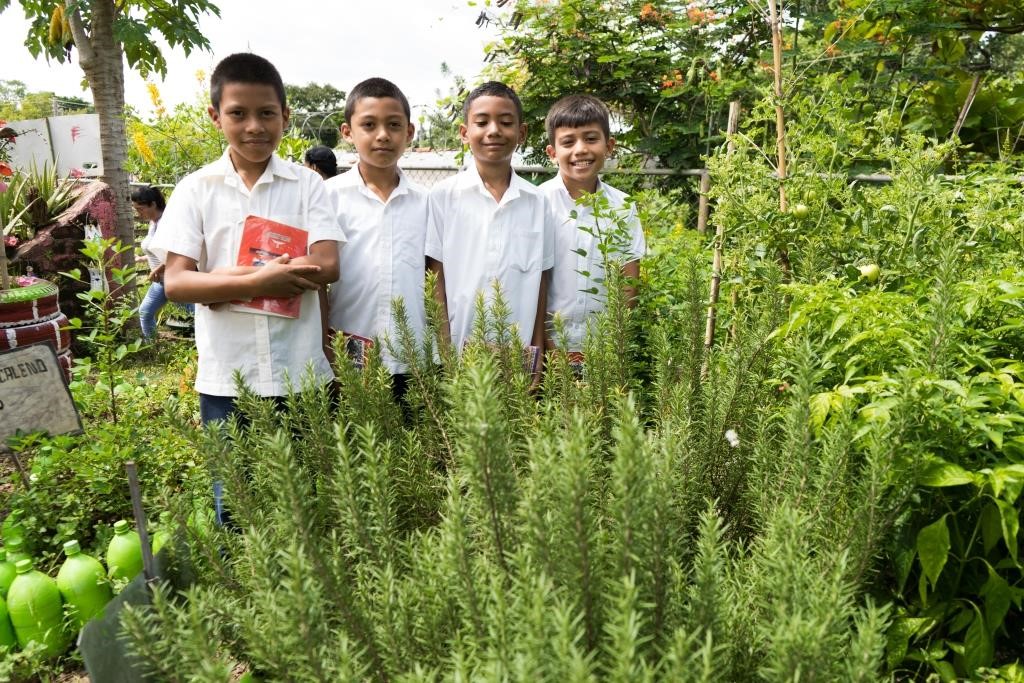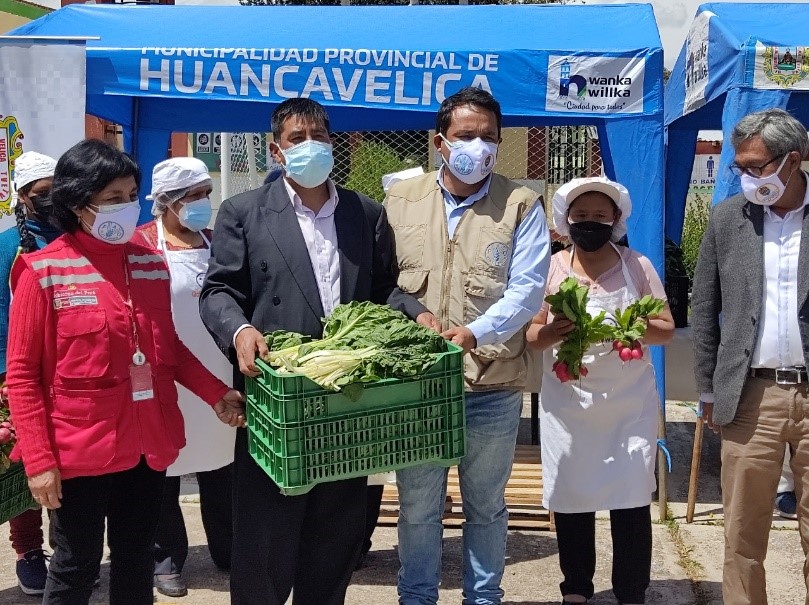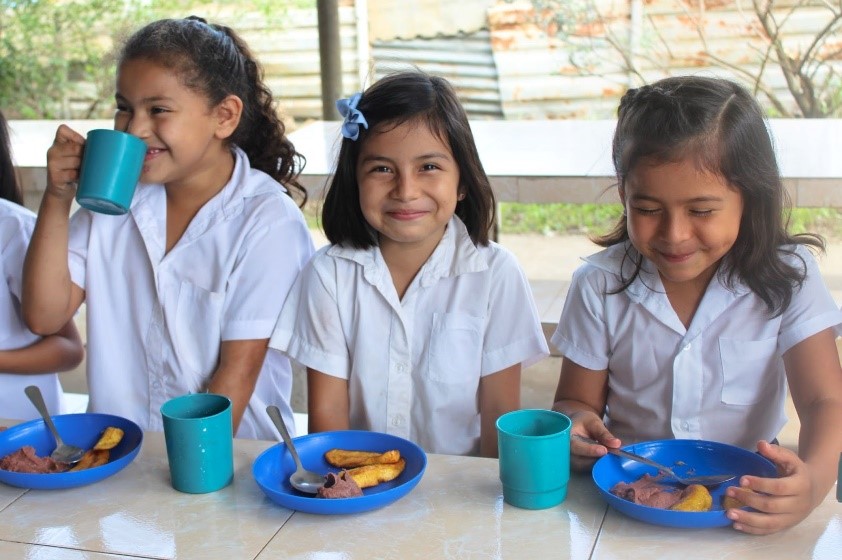 Consolidation of School Feeding Programmes in Latin America and the Caribbean
Using the Sustainable Schools methodology to strengthen and consolidate school feeding programmes
Consolidation of School Feeding Programmes in Latin America and the Caribbean
Using the Sustainable Schools methodology to strengthen and consolidate school feeding programmes

Challenges
The Latin American and Caribbean region faces many food security challenges. According to the Regional Overview of Food Security and Nutrition in 2021, during the COVID-19 pandemic, hunger reached a total of 59.7 million people. In addition, 40 percent of the region’s inhabitants, or 267 million people, experienced moderate or severe food insecurity in 2020. Meanwhile, the number of obese and overweight people, including children under 5, is increasing. UNICEF data from 2021 (www.unicef.org/lac/en/reports/childhood-overweight) shows that almost four million children are overweight in the region.
These numbers reflect a lack of access to healthy diets and the low quality of food, mainly among the most vulnerable populations, in a context of rising food prices. To reverse this scenario, strengthening national school feeding programmes is an essential strategy. School feeding programmes serve 85 million students per day in the Latin America and Caribbean region. For many children, school meals represent the healthiest meal of their day, allowing the consumption of fresh and local products. Thus, schools support food security and have become a crucial place to guarantee the human right to adequate food for children in many countries.
Towards a Solution
Over the past decades, Brazil’s level of development in food and nutrition security, supported by successful public policies, has helped the country eradicate hunger, improved the human right to adequate food and strengthened rural development and family farming. This has made Brazil a reference source for the region. With this in mind, the Brazil-FAO International Cooperation Programme was initiated in 2008, and continues today, as a means for the Brazilian Cooperation Agency of the Ministry of Foreign Affairs (ABC/MRE) and the Food and Agriculture Organization of the United Nations (FAO) to share experiences and knowledge from Brazil with other countries in the region.
To help countries in the region strengthen their school feeding policies, the Consolidation of School Feeding Programmes in Latin America and the Caribbean project was established, using the Sustainable Schools methodology, engaging 15 countries in the region. This initiative contributes to the achievement of several Sustainable Development Goals, including SDG 1 (no poverty), SDG 2 (zero hunger), SDG 3 (good health and well-being), SDG 4 (quality education), SDG 8 (decent work and economic growth), SDG 12 (responsible consumption and production) and SDG 17 (partnerships for the goals).
The Sustainable Schools methodology was jointly designed with the government of each country to establish a reference for sustainable school feeding programmes and invites the participation of national and local technical teams from related government ministries (mainly education, health, agriculture, planning and social development).
The Sustainable Schools methodology has six components: inter-institutional and inter-sectoral articulation; social participation; adequate infrastructure; food and nutrition education with educational school gardens; healthy and tasty menus; and public purchases of food from family farms. The components were developed in pilot schools and cities selected by governments respecting the context of each country. The pilot schools constitute learning laboratories for school feeding programmes seeking a scaling up at the national level.
To enhance the sustainability of the process, each country organizes an inter-sectoral technical committee, drawing upon technicians from various ministries (especially health, education and agriculture) that follow up the process and facilitate dialogue and discussions on implementation of the school feeding programme. Later, the country delimits the responsibilities of each party. The Brazil-FAO International Cooperation shares the Brazilian experience and offers technical assistance in terms of monitoring and guiding and supporting implementation of the methodology in each country. The Brazil-FAO International Cooperation also facilitates policy dialogue and exchanges of experiences among the countries involved.
Governments at all levels, national, departmental and municipal, are involved in the programme, with each having different roles and responsibilities and contributions. School feeding is consolidated as a state policy, guaranteeing, among other benefits, resources for its execution. Since the work of the Brazil-FAO Cooperation on school feeding began in the region, five countries adopted specific laws on school feeding: Bolivia, Ecuador, Guatemala, Honduras and Paraguay. El Salvador is drafting a school feeding law proposal. These laws are important to ensure and guarantee the institutionalization, implementation and sustainability of school feeding programmes in countries.
As a result of the initiative’s dialogue among countries, a South-South network was created, the Sustainable School Feeding Network (RAES), that meets regularly. A virtual space was created for participants to share experiences and exchange knowledge.
Dialogue with the countries showed the importance of school feeding to reduce school evasion and dropout, improve learning and school performance and tackle hunger and malnutrition. In addition, these programmes, which directly purchase from family farms, are an important instrument to break the cycle of hunger and poverty and to improve the livelihoods of smallholder farmers by allowing them to sell their fresh products in favourable conditions, generating income for local families.
Data produced by the Brazil-FAO International Cooperation Programme shows that 23,000 Sustainable Schools are in operation in 2021, benefiting 1.6 million students and around 9,500 family farmers throughout 15 countries. The Sustainable Schools address the impacts of crises and instability, help improve the quality of school feeding programmes and guarantee the provision of healthy school meals to more students. The Sustainable Schools methodology supports the elaboration and implementation of specific laws that can strengthen the institutionalization and sustainability of national school feeding programmes.
Guatemala, for instance, adopted a school feeding law based on the Sustainable Schools methodology. The Sustainable Schools experience had raised awareness among parliamentarians and government actors of the importance of school feeding. The country approved its law in 2017 to ensure the right to adequate food to students, guaranteeing the provision of school meals to over two million students over 180 school days per year, with healthy diets in public and private schools, and facilitating the purchase of food from family farms.
Contact Information
Countries involved
Supported by
Implementing Entities
Project Status
Project Period
URL of the practice
Primary SDG
Primary SDG Targets
Secondary SDGs
Secondary SDG Targets
Similar Solutions
| NAME OF SOLUTION | Countries | SDG | Project Status | |
|---|---|---|---|---|
100% Online Electronic Apostille and Legalization Sharing Colombia’s effective e-government system with other countries in the region |
Belize, Brazil, Dominican Republic, El Salvador, Grenada, Guatemala, Guyana, Honduras, Jamaica, Paraguay, Peru, Saint Lucia, Saint Vincent and the Grenadines | 16 - Peace and Justice Strong Institutions | Completed | View Details |
Adapting Digital Payment to Initiate Rapid Response During Pandemic Bangladesh government disbursed cash aid to 5 million most vulnerable families through mobile financial service in order to minimize the financial impact during COVID 19 within the shortest period of time. |
Belize, Brazil, Dominican Republic, El Salvador, Grenada, Guatemala, Guyana, Honduras, Jamaica, Paraguay, Peru, Saint Lucia, Saint Vincent and the Grenadines | 03 - Good Health and Well-being 05 - Gender Equality | Completed | View Details |
ADAPT PLAN in Malawi |
Belize, Brazil, Dominican Republic, El Salvador, Grenada, Guatemala, Guyana, Honduras, Jamaica, Paraguay, Peru, Saint Lucia, Saint Vincent and the Grenadines | 01 - No Poverty 05 - Gender Equality 11 - Sustainable Cities and Communities | Ongoing | View Details |
Addressing Racial and Ethnicity-based Discrimination and Strengthening the Protection of Rural Afro-descendants UNFPA supports data disaggregation as a tool to fight racism and ethnic discrimination |
Belize, Brazil, Dominican Republic, El Salvador, Grenada, Guatemala, Guyana, Honduras, Jamaica, Paraguay, Peru, Saint Lucia, Saint Vincent and the Grenadines | 01 - No Poverty 02 - Zero Hunger 03 - Good Health and Well-being 05 - Gender Equality 06 - Clean Water and Sanitation 11 - Sustainable Cities and Communities 16 - Peace and Justice Strong Institutions | Ongoing | View Details |
ADELANTE Triangular Cooperation European Union – Latin America and the Caribbean |
Belize, Brazil, Dominican Republic, El Salvador, Grenada, Guatemala, Guyana, Honduras, Jamaica, Paraguay, Peru, Saint Lucia, Saint Vincent and the Grenadines | 10 - Reduced Inequalities | Ongoing | View Details |


